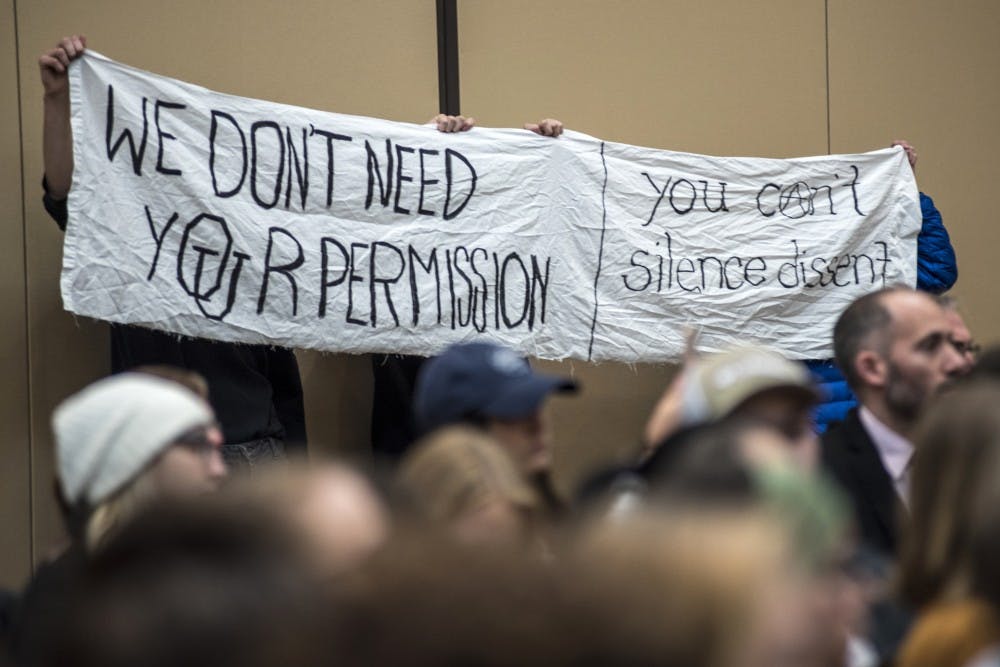About seven students stood in the back of Baker Ballroom protesting Ohio University’s process to implement a policy on speech and public protests.
Many attended the “Freedom of Expression” open forum Wednesday evening to voice dissent in regard to the presidential policy advisory group’s considerations revising OU’s interim policy. Nearly all of Baker Ballroom was full.
“The ‘Freedom of Expression’ policy seems to be taken straight out of Orwell’s 1984,” Catherine Cutcher, assistant director for OU’s global studies programs, said. "This proposed policy violates the First Amendment and free speech rights of all members of this community."
When the policy group was asked if the administration required such a policy to be put in place, members shook their heads no.
The group plans to vote on considerations “in the coming days,” Scripps College of Communication Dean Scott Titsworth said.
“We recognize that we are fallible humans and that we cannot craft perfect … considerations and so what we want to hear from you are ideas that we might be able to use over the next several days to craft a better set of recommendations that we would set forward to the provost and to the president,” Titsworth said.
Many participants in the open forum demanded that there should not be any university policy regulating expression.
“The university has too much freedom to stop free speech currently,” Hazel Goodburn, a sophomore studying anthropology and music, said. “If you want to have discourse, peaceful discourse, then don’t entangle police into the discourse. Don’t entangle students into the prison-industrial system.”
Members of the Bobcat 70, OU American Civil Liberties Union chapter and faculty reiterated that they believe the current policy is unconstitutional.
“There are some of us who believe that this is unconstitutional, and tweaking an unconstitutional document still leaves it as an unconstitutional document,” Nerissa Young, a journalism instructor, said.
Faculty and students also discussed how the policy is an effort of risk management by the university.
“I think this crisis (of the policy) has really brought to the forefront the way in which this pernicious logic of risk management in our society is trampling on all kinds of other values,” Faculty Senate Chair Joe McLaughlin said.
Gabrielle Tharp, a junior studying political science pre-law, said risk management for the university should not mean increased risk for students.
“Let’s think about two instances of risk management with the police. Let’s think about Kent State University; their idea of risk management got students killed. Let’s think about Charlottesville, Virginia; their confidence in risk management got students killed,” Tharp said.
Ziad Abu-Rish, an assistant professor of history, urged the presidential policy advisory group to meet with someone from the OU ACLU because the only legal representative the group has consulted with represents the university.
“The courts handled (the Baker 70), and they determined the students were fully within their rights, and the university then decided to implement a new policy,” Abu-Rish said. “We should be very clear about what this protest policy is about and what it’s response to. We should reject at any moment that this is any claim about safety. This is about the university losing a legal battle and trying to put itself in a position to win the next legal battle.”






